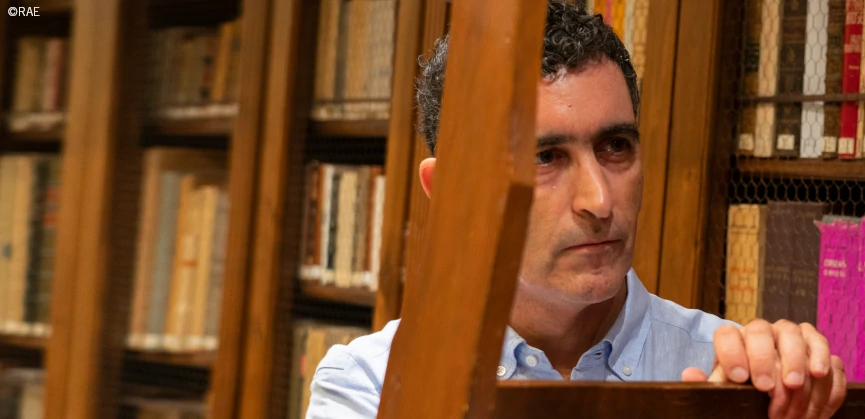Main content
Juan Mayorga 2022 Princess of Asturias Award for Literature

Juan Antonio Mayorga Ruano was born on 6th April 1965 in Madrid. He studied Philosophy and Mathematics and furthered his philosophical training at the universities of Münster, Berlin and Paris. He received his PhD in 1997 with a thesis on the thinking of Walter Benjamin. Previously, he had taken writing workshops with Marco Antonio de la Parra and José Sanchís Sinisterra, and had also participated in courses at the Royal Court Theatre International Playwrights Group Residency in London.
He published his first play, Siete hombres buenos, in 1989, which earned him the Marqués de Bradomín Runner-up Prize from the Spanish Youth Institute. He has taught Playwriting and Philosophy at the Royal School of Dramatic Art in Madrid and directed the seminar “Memory and Thought in Contemporary Theatre” at the Spanish National Research Council’s Institute of Philosophy. He has also taught Mathematics at various universities and secondary schools. He currently directs the Teatro de La Abadía and the Corral de Comedias in Alcalá de Henares, and is director of the Chair of Performing Arts and of the Master’s programme in Theatrical Creation at the Carlos III University (Madrid).
Recognized as one of the most outstanding playwrights on the current theatre scene, Mayorga founded the theatrical writing group El Astillero in 1993 together with other authors. A year later, the first adaptation of one of his texts, Más ceniza (1992 Calderón de la Barca Award), was premiered under the direction of Adolfo Simón at the Cuarta Pared Theatre in Madrid. He founded the company La Loca de la Casa in 2011, with which he staged his play La lengua en pedazos in 2012. With his creations, in which critics have found references to the theatre of Tom Stoppard, David Hare and Harold Pinter, he seeks to confront the public with reality via conflict, challenging the spectator’s convictions, sensitivity and point of view, without evading current political and social issues.
His early plays include El traductor de Blumemberg (1993), El sueño de Ginebra (1993), Cartas de amor a Stalin (1997), El jardín quemado (1999) [English translation, The Scorched Garden, 2020], La mujer de mi vida (1999) and El Gordo y el Flaco (2001). His creative career has been linked to the Animalario theatre company and to fellow playwright Andrés Lima. He has written several plays with Lima, such as Alejandro y Ana. Lo que España no pudo ver del banquete de la boda de la hija del presidente (2002) –in which Mayorga coined the term “emergency historical theatre”–, Últimas palabras de Copito de Nieve (2004) and Hamelin (2005) [English translation, 2006], all for Animalario. Other texts of his include El chico de la última fila (2006), La paz perpetua (2007), El cartógrafo (2009), Reikiavik (2012), El Golem (2015), El mago (2017) and Intensamente azules (2018). In 2019, Spain’s National Drama Centre (CDN) premiered Shock 1 (El cóndor y el puma) and, in 2021, did the same with Shock 2 (La tormenta y la guerra), co-written by Mayorga and Lima, Albert Boronat and Juan Cavestany, close to the so-called “documentary theatre” of a marked political and social nature and based on the book The Shock Doctrine by the Canadian writer Naomi Klein. His latest play, Silencio (2022), was written based on his entrance speech for the Royal Spanish Academy (RAE). Mayorga has also adapted classical plays and has been translated into more than thirty languages, his plays having been performed on stages around the world. He has compiled a large part of his stage plays in Teatro 1989-2014 (2014), his short pieces in Teatro para minutos (2020) and his essays, talks and articles written between 1990 and 2016 in Elipses (2016).
Member of the Royal Spanish Academy (2000 Prince of Asturias Award for Concord) since 2019, he is also member of the Royal Academy of Doctors of Spain, honorary member of the Royal Spanish Mathematical Society and member of the Scientific Committee of Spain’s National Library. In Spain, he has received the RNE Ojo Crítico Award (2000), the Telón de Chivas Award for the Performing Arts (2005), the National Theatre Award (2007), the Valle-Inclán Award (2009), the National Dramatic Literature Award (2013) and five Max Awards for the Performing Arts. He was awarded the Europe Prize for New Theatrical Realities in 2016.
End of main content
